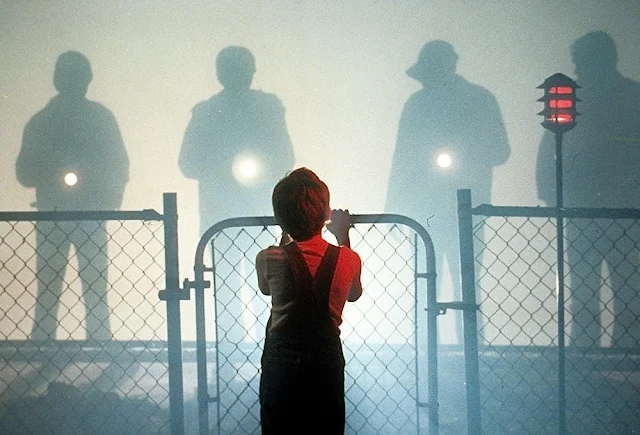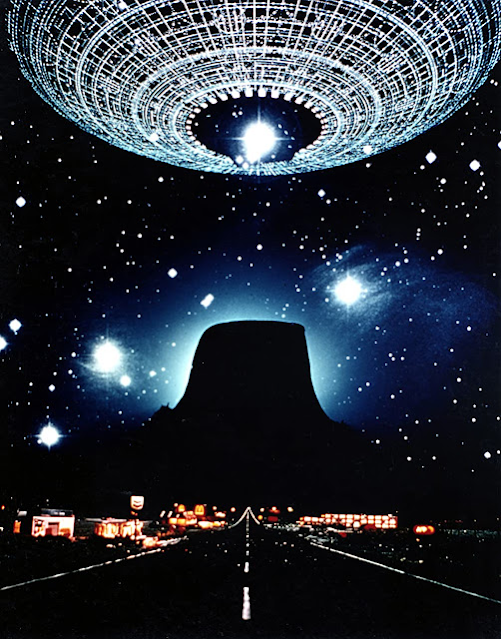In this discussion, we aim to explore Spielberg's films with science fiction elements and delve into their themes, narrative techniques, and lasting impact on the genre. By examining these aspects, we can gain a deeper understanding of Spielberg's creative vision and the ways in which he has shaped the landscape of science fiction cinema.
Overview of Spielberg's Science Fiction Films
Steven Spielberg has helmed a remarkable array of science fiction films throughout his career. Here are some notable examples:
- "Close Encounters of the Third Kind" (1977): This iconic film explores humanity's fascination with extraterrestrial life and the desire to make contact. It combines awe-inspiring visuals, a memorable score, and a sense of wonder, solidifying its place as a sci-fi classic.
- "E.T. the Extra-Terrestrial" (1982): A heartwarming tale of friendship between a young boy and a stranded alien, this film captured the imaginations of audiences worldwide. It skillfully blends science fiction elements with heartfelt storytelling, emphasizing themes of empathy, connection, and the exploration of the unknown.
- "Jurassic Park" (1993): Based on Michael Crichton's novel, Spielberg brought dinosaurs back to life on the big screen in an awe-inspiring and thrilling manner. The film showcases Spielberg's mastery of suspense and adventure, as well as his ability to seamlessly blend groundbreaking visual effects with compelling storytelling. Speilberg helmed the sequel and produced the second sequel as well.
- "Minority Report" (2002): Set in a future where crime can be predicted and prevented, this film delves into themes of free will, ethics, and the potential dangers of technology. Spielberg skillfully navigates the complexities of a dystopian world while delivering thought-provoking social commentary.
- "War of the Worlds" (2005): Inspired by H.G. Wells' novel, this film explores the invasion of Earth by extraterrestrial beings. It showcases Spielberg's talent for creating intense and suspenseful sequences, combining intimate family dynamics with larger-scale action.
 |
| Eliot in E.T. The Extraterrestrial |
Visually, Spielberg employs a mix of awe-inspiring special effects (Ready Player One), practical sets, and meticulous attention to detail. His ability to seamlessly blend CGI with practical effects enhances the immersion and believability of his fictional worlds.
Storytelling-wise, Spielberg is a master of pacing, suspense, and building tension. He often explores the juxtaposition of ordinary people facing extraordinary circumstances, allowing audiences to connect with the characters and their struggles on a personal level. His films frequently touch upon societal issues, ethical dilemmas, and the consequences of technological advancements, provoking thought and reflection.
Themes and Motifs in Spielberg's Science Fiction Films
Steven Spielberg's science fiction films often explore several common themes, which contribute to their enduring popularity and resonance:
Exploration of wonder, innocence, and childlike curiosity: Spielberg often incorporates themes of wonder and childlike curiosity into his science fiction narratives. This is exemplified through the eyes of young protagonists like Elliott or the grandchildren in "Jurassic Park," who embark on extraordinary adventures that evoke a sense of awe and rekindle the wonder of the unknown.
The impact of science and innovation on society and individuals: Spielberg's science fiction works frequently explore the consequences of scientific advancements and their effects on society. In films like "Minority Report" and "War of the Worlds," he delves into the ethical dilemmas and potential dangers of technology, showcasing the impact it can have on both a societal and personal level.
Spielberg effectively employs various motifs and symbols to convey these themes within his science fiction films:
Journey and exploration: Spielberg frequently employs the motif of the journey, both physical and emotional, in his science fiction films. Characters embark on transformative quests, encountering extraordinary circumstances that challenge and change them. This motif is particularly evident in films like "Close Encounters of the Third Kind" and "Jurassic Park."
Family and connection: Family dynamics and the power of human connection are prominent in Spielberg's science fiction works. The exploration of familial relationships and the bond between characters, such as the broken family dynamics in "War of the Worlds" or the profound friendship in "E.T. the Extra-Terrestrial," add emotional depth and provide a relatable anchor within fantastical settings.
The loss of innocence: Spielberg often incorporates the loss of innocence as a thematic element, particularly through the eyes of child protagonists. The exposure to extraordinary events forces these characters to confront harsh realities and mature beyond their years. This loss of innocence can be seen in films like "E.T. the Extra-Terrestrial" and "War of the Worlds."
By utilizing these motifs and symbols, Spielberg enhances the thematic depth and emotional resonance of his science fiction films, allowing audiences to engage with the underlying messages and reflect on the human condition within extraordinary circumstances.
 |
| Close Encounters of the Third Kind |
Spielberg's Contribution to the Science Fiction Genre
Steven Spielberg's influence on the science fiction genre is far-reaching and significant. His contributions have shaped the way science fiction is approached in filmmaking, leaving an indelible mark on both storytelling and visual effects:
Blending science fiction with human drama: One of Spielberg's strengths lies in his ability to seamlessly blend science fiction elements with human drama. He places a strong emphasis on character development, emotions, and relatable narratives, allowing audiences to connect with the story on a deeper level. By infusing science fiction with genuine human experiences, Spielberg creates emotionally resonant stories that transcend the genre.
Visual effects and immersive worlds: Spielberg's films have often pushed the boundaries of visual effects, resulting in groundbreaking techniques and stunning visual landscapes. From the awe-inspiring spaceship encounters in "Close Encounters of the Third Kind" to the breathtaking dinosaurs in "Jurassic Park," Spielberg's visionary use of effects has set new standards for creating immersive worlds that captivate audiences and transport them into fantastical realms.
Inspiration and influence: Spielberg's science fiction films have inspired and influenced subsequent filmmakers in the genre. His ability to create compelling narratives while delivering spectacle has set a benchmark for storytelling in science fiction. Filmmakers such as J.J. Abrams, Christopher Nolan, and Guillermo del Toro (Pan's Labyrinth) have cited Spielberg as a major influence on their work, reflecting his enduring impact on the genre.
Spielberg played a pivotal role in popularizing science fiction among mainstream audiences, bringing the genre to the forefront of popular culture:
Broadening the appeal: Through his films, Spielberg successfully appealed to a wide range of audiences, not just hardcore science fiction enthusiasts. By infusing his narratives with relatable characters, emotional depth, and universal themes, he made science fiction accessible and appealing to mainstream viewers who may not have been drawn to the genre initially.
Bridging the gap between spectacle and storytelling: Spielberg's ability to combine breathtaking visuals with compelling narratives helped bridge the gap between blockbuster spectacle and substantive storytelling. He demonstrated that science fiction could be both visually stunning and intellectually engaging, captivating audiences while also provoking thought and emotional resonance.
Box office success and cultural impact: Spielberg's science fiction films have consistently achieved both critical acclaim and commercial success. Movies like "E.T. the Extra-Terrestrial" and "Jurassic Park" became cultural touchstones, breaking box office records and captivating audiences worldwide. Their immense popularity helped solidify science fiction as a genre capable of resonating with mass audiences and garnering mainstream acclaim.
Critical Reception and Legacy of Spielberg's Science Fiction Films
Spielberg's science fiction films have garnered both critical acclaim and box office success, solidifying his status as a master storyteller and visionary filmmaker.
Here are a few examples:"Close Encounters of the Third Kind" (1977): The film was widely praised for its awe-inspiring visuals, compelling storytelling, and Richard Dreyfuss's performance. It received numerous accolades and was nominated for eight Academy Awards, including Best Director for Spielberg.
"E.T. the Extra-Terrestrial" (1982): Universally acclaimed, "E.T." became a cultural phenomenon and the highest-grossing film of all time upon its release. It received critical acclaim for its heartfelt storytelling, exceptional performances, and the iconic image of Elliott and E.T. flying across the moon.
3. "Jurassic Park" (1993): A groundbreaking achievement in visual effects, "Jurassic Park" redefined the possibilities of CGI and set new standards for immersive blockbuster filmmaking. It received widespread acclaim for its thrilling narrative, innovative effects, and memorable characters.
Spielberg's science fiction works have left a lasting impact on both the genre and popular culture:
- Shaping the genre: Spielberg's films have influenced the trajectory of science fiction storytelling. Through his combination of spectacle, emotion, and relatable characters, he broadened the genre's appeal and showcased its potential for depth and resonance. His films set a benchmark for blending science fiction with human drama, inspiring subsequent filmmakers to explore similar themes and techniques.
- Cultural milestones: Spielberg's science fiction films, such as "E.T. the Extra-Terrestrial" and "Jurassic Park," have become cultural touchstones, ingrained in popular culture and continuing to resonate with audiences across generations. They have left an indelible mark on the collective imagination, with memorable characters, iconic moments, and unforgettable scores that have become synonymous with the genre itself.
- Advancing visual effects and technology: Spielberg's films have pushed the boundaries of visual effects, inspiring advancements in the field. From the lifelike dinosaurs of "Jurassic Park" to the awe-inspiring encounters in "Close Encounters of the Third Kind," his pioneering use of effects has had a profound impact on the industry, influencing subsequent filmmakers and elevating the standard of visual storytelling.
Spielberg's films continue to influence contemporary science fiction filmmakers:
Balancing spectacle with substance: Spielberg's ability to balance blockbuster spectacle with substantive storytelling continues to serve as a model for contemporary science fiction filmmakers. His films remind filmmakers to prioritize character development, emotional engagement, and thought-provoking themes alongside visual spectacle, creating a more well-rounded and impactful cinematic experience.
Spielberg's science fiction films have left an undeniable legacy on the genre and popular culture, shaping storytelling techniques, advancing visual effects, and inspiring subsequent filmmakers to push the boundaries of science fiction cinema. His influence remains prevalent in contemporary science fiction works, ensuring that his impact on the genre will continue to be felt for years to come.
Special interest film: A.I. Artificial Intelligence
"A.I. Artificial Intelligence" is a science fiction drama film that explores the themes of artificial intelligence, humanity, and the quest for love. The project had been in development by Stanley Kubrick for many years, but he ultimately entrusted Steven Spielberg to bring his vision to life. Kubrick's fascination with the concept of artificial intelligence and its implications on humanity formed the foundation of the story.

The story revolves around a highly advanced humanoid robot named David (portrayed by 'hot kid' of the moment after his turn in The Sixth Sense, Haley Joel Osment) designed to experience and express human emotions. David is adopted by a couple whose own son is in a state of cryogenic sleep. As David embarks on a journey to become "real" and find a place where he truly belongs, he encounters various challenges, including the pursuit of love and acceptance.
Through David's quest, the film raises thought-provoking questions about the nature of consciousness, the limits of artificial intelligence, and the essence of what it means to be human. It explores the complexities of human emotions and the yearning for connection in a world where artificial beings coexist with humans.
Spielberg dedicated "A.I. Artificial Intelligence" to Stanley Kubrick as a testament to their collaboration and friendship. He strived to preserve Kubrick's vision while infusing the film with his own directorial touches. The result is a visually stunning and emotionally resonant film that captures the essence of both filmmakers' sensibilities.
While the film received mixed reviews upon its release, "A.I. Artificial Intelligence" has gained a cult following and continues to be appreciated for its ambitious storytelling, visual effects, and philosophical themes. The collaboration between Spielberg and Kubrick on this project stands as a unique example of two visionary filmmakers coming together to explore the boundaries of science fiction and the human experience.















